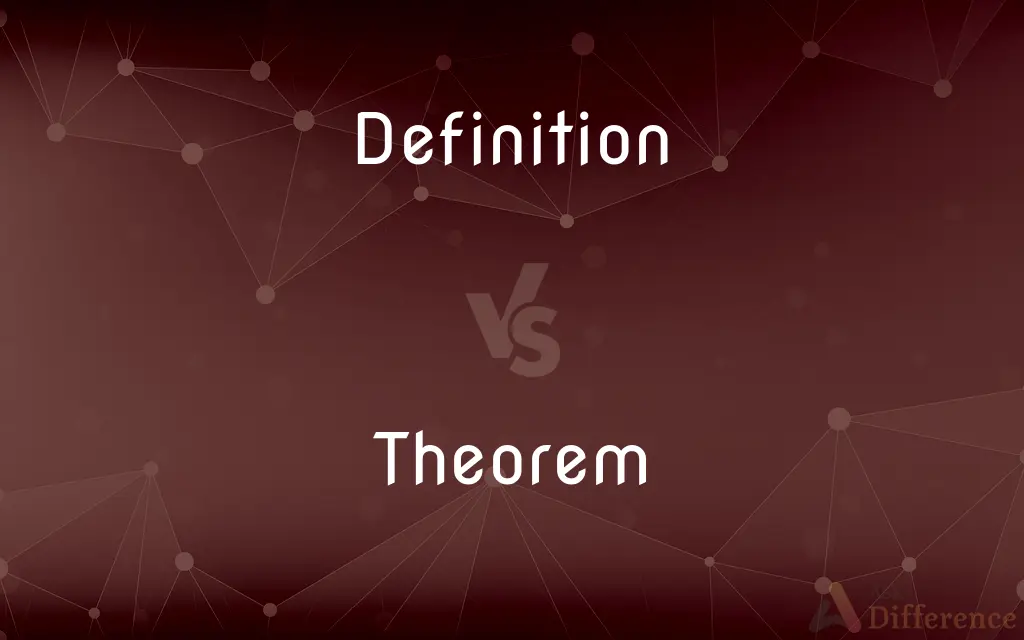Definition vs. Theorem — What's the Difference?
By Tayyaba Rehman & Maham Liaqat — Updated on April 16, 2024
A definition explains the meaning of a term, focusing on establishing clear parameters; a theorem is a statement proven on the basis of previously established statements in mathematics.

Difference Between Definition and Theorem
Table of Contents
ADVERTISEMENT
Key Differences
A definition in any field, such as mathematics or logic, is a precise explanation of the meaning of a term or concept, intended to clarify and set boundaries. On the other hand, a theorem is a proposition that has been or needs to be proven true, based on a set of axioms and previously proven theorems.
Definitions are foundational in creating a common understanding of terms and concepts, ensuring that discussions and arguments are based on the same meanings. Whereas theorems are crucial for developing and advancing knowledge in fields like mathematics, demonstrating what can be logically concluded from definitions and axioms.
In practice, definitions do not require proof but must be universally agreed upon to be useful. On the other hand, theorems must be rigorously proven through logical deduction, and this proof is critical to its acceptance in the academic community.
While definitions are often simple and straightforward, stating what a thing is or is not, theorems can be complex, often requiring a deep understanding of many interconnected concepts to both understand and prove.
Definitions are used in every discipline to provide clarity and consistency in the use of terms. Theorems, however, are primarily used in formal sciences like mathematics and logic, where they form the backbone of theoretical structures.
ADVERTISEMENT
Comparison Chart
Nature
Explanatory, non-provable
Propositional, provable
Purpose
To establish clear, agreed-upon meanings
To demonstrate truths based on axioms
Field of Use
All academic and practical fields
Primarily mathematics and logic
Requirement
Universal agreement
Rigorous logical proof
Complexity
Generally simple and straightforward
Can be highly complex, requiring deep understanding
Compare with Definitions
Definition
A statement that explains the meaning of a word or phrase.
The definition of 'biodiversity' encompasses the variety of life within an ecosystem.
Theorem
A mathematical statement that is proved on the basis of previously established statements within a formal system.
Pythagoras' theorem describes the relation of the sides of a right triangle.
Definition
A description that sets out the exact criteria of an idea or concept.
The scientific definition of a mineral involves specific characteristics like crystal structure.
Theorem
A proposition that has been proven on the basis of other theorems and axioms.
The fundamental theorem of algebra states that every non-constant single-variable polynomial with complex coefficients has at least one complex root.
Definition
A statement that clarifies something by outlining its form or structure.
The legal definition of 'theft' involves the unauthorized taking of someone else's property.
Theorem
An established principle in science supported by evidence.
Theorem: Energy cannot be created or destroyed, only transformed.
Definition
An explanation that distinguishes something from other entities.
The definition of an acid in chemistry involves its ability to donate a proton.
Theorem
A logically deduced conclusion from a set of premises.
The theorem on limits underpins calculus.
Definition
A specification of the essential properties of something.
His definition of a good job includes high pay and personal satisfaction.
Theorem
A rule in mathematics that is demonstrably true.
Theorem: Two parallel lines never intersect.
Definition
A definition is a statement of the meaning of a term (a word, phrase, or other set of symbols). Definitions can be classified into two large categories, intensional definitions (which try to give the sense of a term) and extensional definitions (which try to list the objects that a term describes).
Theorem
In mathematics and logic, a theorem is a non-self-evident statement that has been proven to be true, either on the basis of generally accepted statements such as axioms or on the basis of previously established statements such as other theorems. A theorem is hence a logical consequence of the axioms, with a proof of the theorem being a logical argument which establishes its truth through the inference rules of a deductive system.
Definition
A statement of the exact meaning of a word, especially in a dictionary
A dictionary definition of the verb
Theorem
An idea that has been demonstrated as true or is assumed to be so demonstrable.
Definition
The degree of distinctness in outline of an object, image, or sound
The clarity and definition of pictures can be aided by using computer graphics
Theorem
(Mathematics) A proposition that has been or is to be proved on the basis of explicit assumptions.
Definition
A statement of the meaning of a word, phrase, or term, as in a dictionary entry.
Theorem
(mathematics) A mathematical statement of some importance that has been proven to be true. Minor theorems are often called propositions. Theorems which are not very interesting in themselves but are an essential part of a bigger theorem's proof are called lemmas.
Definition
A statement or description of the fundamental character or scope of something
"[The panel] calls for a clearer definition of the status of people captured in American military operations" (Economist).
Theorem
A mathematical statement that is expected to be true
Fermat's Last Theorem'' was known thus long before it was proved in the 1990s.
Definition
The act or process of stating a precise meaning or significance; formulation of a meaning
The definition of terms is essential to any successful scholarly study.
Theorem
(logic) A syntactically correct expression that is deducible from the given axioms of a deductive system.
Definition
The state of being clearly outlined
"With the drizzle, the trees in the little clearing had lost definition" (Anthony Hyde).
Theorem
(transitive) To formulate into a theorem.
Definition
The level of detail in a recording, production, or digital encoding of an image or sound.
Theorem
That which is considered and established as a principle; hence, sometimes, a rule.
Not theories, but theorems ( ), the intelligible products of contemplation, intellectual objects in the mind, and of and for the mind exclusively.
By the theorems,Which your polite and terser gallants practice,I re-refine the court, and civilizeTheir barbarous natures.
Definition
A statement of the meaning of a word or word group or a sign or symbol (dictionary definitions).
Your definition of "elephant" needs to be more precise than "a big animal with large ears".
Theorem
A statement of a principle to be demonstrated.
Definition
A clear instance conforming to the dictionary or textbook definition.
Theorem
To formulate into a theorem.
Definition
A statement expressing the essential nature of something; formulation
Theorem
A proposition deducible from basic postulates
Definition
The action or process of defining.
Theorem
An idea accepted as a demonstrable truth
Definition
The act of defining; determination of the limits.
Definition
A product of defining.
Definition
The action or power of describing, explaining, or making definite and clear.
Her comic genius is beyond definition.
Definition
Clarity of visual presentation, distinctness of outline or detail.
The definition of a telescope.
Improve the definition of an image.
High-defintion videos
Definition
Clarity, especially of musical sound in reproduction.
Definition
Sharp demarcation of outlines or limits.
A jacket with distinct waist definition.
Definition
(bodybuilding) The degree to which individual muscles are distinct on the body.
Definition
(programming) A statement which provides a previous declaration with a value or body of a subroutine (in the case of function).
Definition
(mathematics) A statement that establishes the referent of a term or notation.
Definition
The act of defining; determination of the limits; as, a telescope accurate in definition.
Definition
Act of ascertaining and explaining the signification; a description of a thing by its properties; an explanation of the meaning of a word or term; as, the definition of "circle;" the definition of "wit;" an exact definition; a loose definition.
Definition being nothing but making another understand by words what the term defined stands for.
Definition
Description; sort.
Definition
An exact enunciation of the constituents which make up the logical essence.
Definition
Distinctness or clearness, as of an image formed by an optical instrument; precision in detail.
Definition
A concise explanation of the meaning of a word or phrase or symbol
Definition
Clarity of outline;
Exercise had give his muscles superior definition
Common Curiosities
What is a definition?
A definition is a statement that explains the meaning of a term or concept, setting boundaries for its usage and understanding.
Why are definitions important in academic writing?
They ensure that everyone has a common understanding of terms, which is crucial for clear and effective communication and argumentation.
What is a theorem?
A theorem is a mathematical or logical statement that has been proven based on previously established axioms and theorems.
Can a definition be wrong?
If a definition does not effectively communicate the intended meaning or is not widely accepted, it may be considered inadequate or incorrect.
What makes a theorem valid?
A theorem's validity depends on a logical and rigorous proof based on accepted axioms and previously established theorems.
How does a definition differ from a theorem?
A definition provides the basic meaning of a term without requiring proof, whereas a theorem is a proven statement within a logical or mathematical framework.
What role do axioms play in theorems?
Axioms serve as the foundational truths upon which theorems are built and proven.
Can definitions evolve over time?
Yes, definitions can evolve as new knowledge and contexts emerge, reflecting changes in understanding and usage.
Can a theorem become a definition?
Generally, no; theorems and definitions serve different purposes, with theorems requiring proof and definitions providing fundamental meanings.
How are definitions created?
Definitions are often created through consensus in academic or practical contexts, ensuring that they accurately reflect the intended meaning.
Do all disciplines use definitions the same way?
While all fields use definitions to clarify terms, the specificity and technicality of definitions can vary greatly across disciplines.
What is the impact of a theorem in mathematics?
Theorems help in expanding the understanding and applications of mathematical concepts, often leading to new discoveries and advancements.
Why is proof necessary for a theorem?
Proof is necessary to establish the truth of a theorem within the framework of logical deduction, ensuring its acceptance and application in mathematical contexts.
Are theorems applicable outside of mathematics?
While theorems are most common in mathematics and logic, the concept of proving a theory based on evidence is also applicable in science.
How are theorems tested?
Theorems are tested through proofs, which must logically demonstrate that the theorem holds true under the stipulated conditions.
Share Your Discovery

Previous Comparison
Hacker vs. Haxor
Next Comparison
Duck vs. CanardAuthor Spotlight
Written by
Tayyaba RehmanTayyaba Rehman is a distinguished writer, currently serving as a primary contributor to askdifference.com. As a researcher in semantics and etymology, Tayyaba's passion for the complexity of languages and their distinctions has found a perfect home on the platform. Tayyaba delves into the intricacies of language, distinguishing between commonly confused words and phrases, thereby providing clarity for readers worldwide.
Co-written by
Maham Liaqat














































